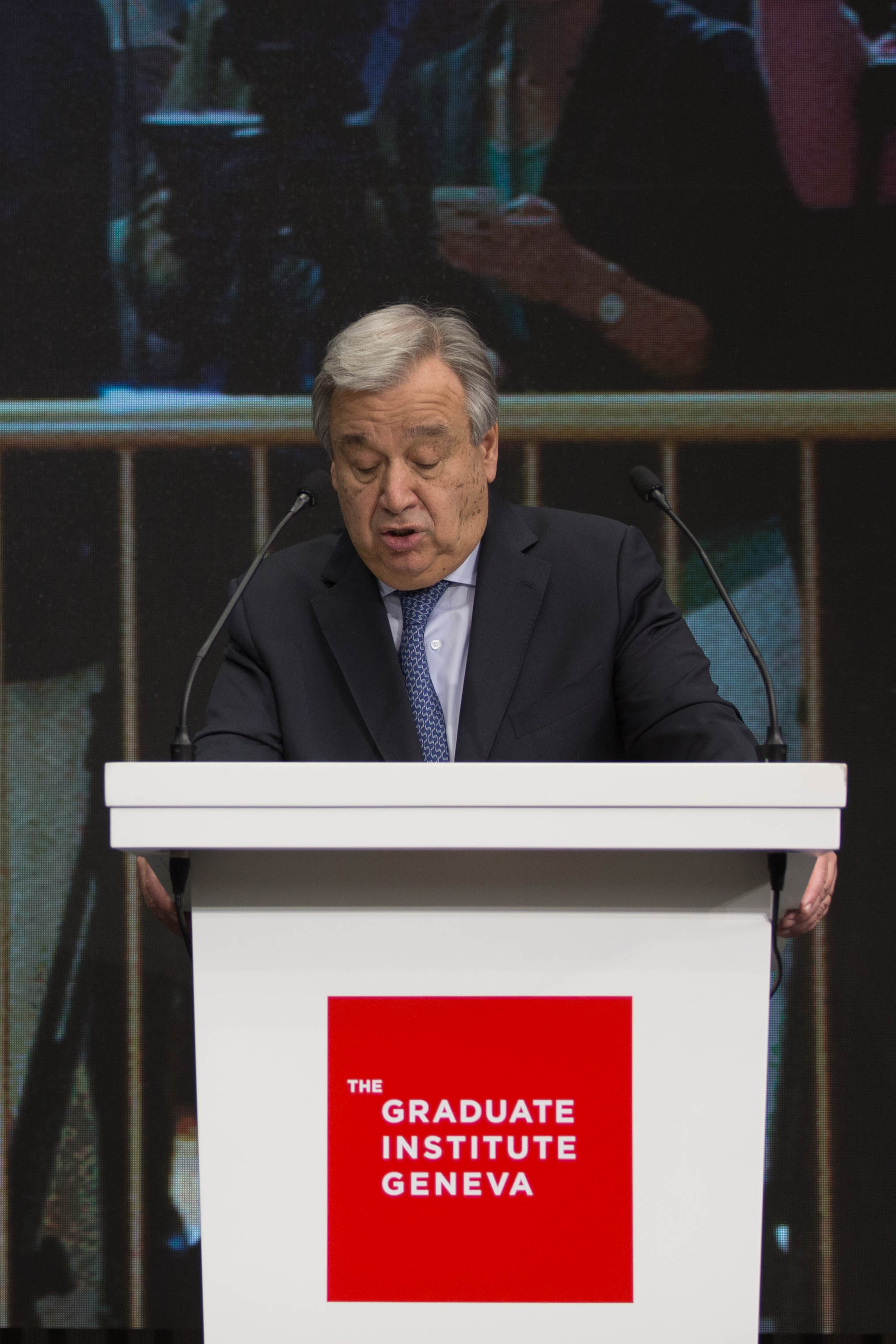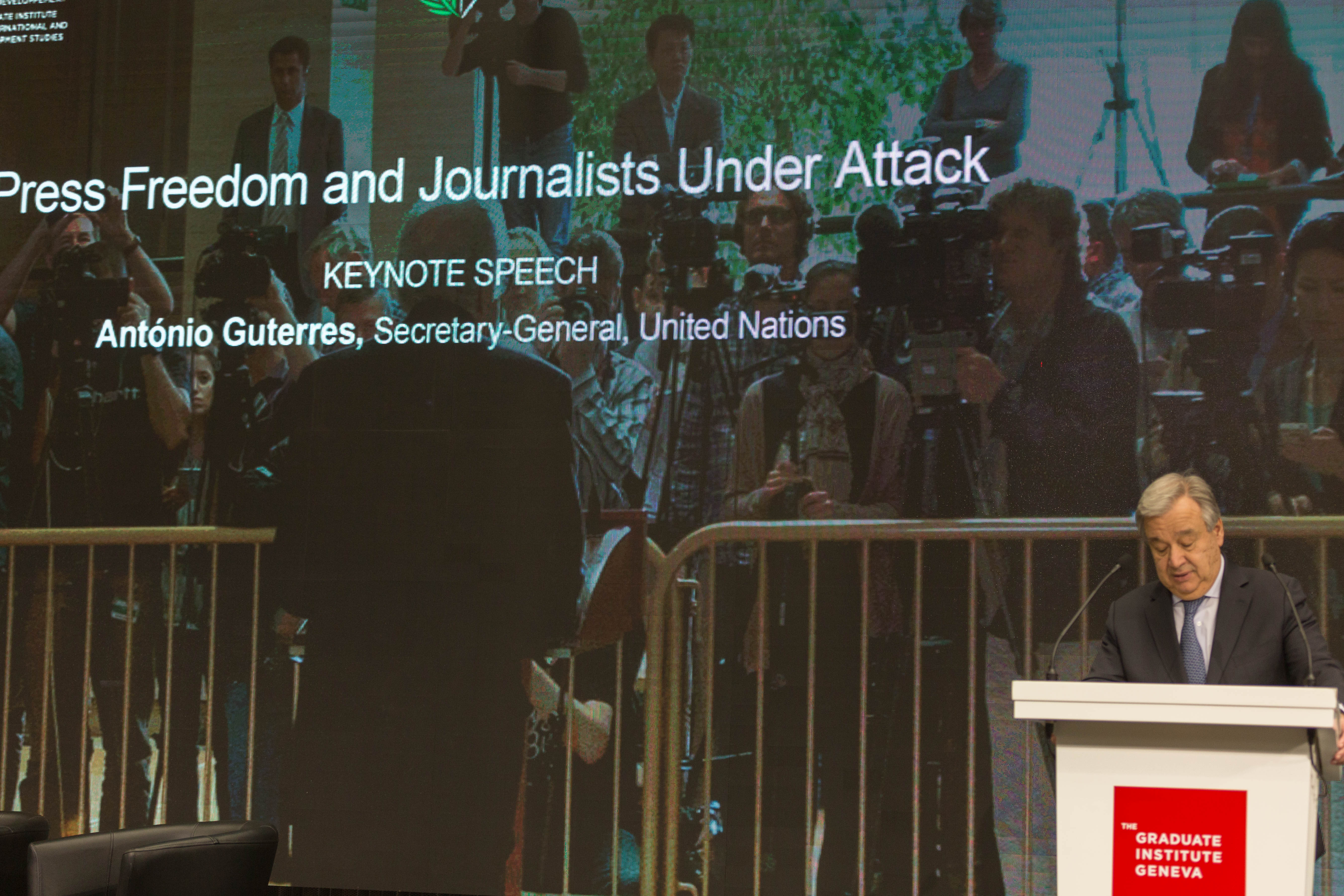Image : (c) S.Deshapriya.
REMARKS BY THE SECRETARY-GENERAL ON THE OCCASION OF THE 70TH ANNIVERSARY OF THE GENEVA ASSOCIATION OF UNITED NATIONS CORRESPONDENTS.
(25 February 2019/ Geneva)
Your excellencies,
Ladies and gentlemen,
Dear journalists,
It is an honour and pleasure to be back here with you today to mark the 70th anniversary of the Geneva Association of United Nations Correspondents, ACANU. I congratulate you on reaching this milestone as an organization, and I wish you all the best for your future success.
I see familiar faces today, of journalists who covered humanitarian crises and refugee issues while I was working here in Geneva as the High Commissioner for Refugees. Many appalling humanitarian crises and issues would never gain international attention without your work.
I remember discussing the refugee situation in Europe with some of you long before it reached its climax, for example. I thank you for your consistent interest and engagement, and for reporting the facts, even when those facts may have made some people uncomfortable.
Some seventy years ago, most of the members of ACANU came from the countries of the Global North, and most were men. The Cold War was in full swing. Around the world, democracies were the exception rather than the norm. There were very few countries in which people were allowed to express themselves freely.
Seventy years on, the situation here at the Association of Correspondents, at the United Nations more generally, and indeed around the world, is fortunately very different.
ACANU itself is much more diverse. Decolonization, the end of the Cold War and other developments have transformed the United Nations and the world we live in. We’ve come a long way towards realizing freedom of expression, and other fundamental freedoms. The right to access to information is entrenched in law in over a hundred countries.
But despite these advances, in recent years, civic space has been shrinking worldwide at an alarming rate. In just over a decade, more than a thousand journalists have been killed while carrying out their indispensable work. And nine out of ten cases are unresolved, with no one held accountable.
Last year alone, UNESCO reports that at least 99 journalists were killed.
Many thousands more have been attacked, harassed, detained or imprisoned on spurious charges, without due process.
This is outrageous. This should not become the new normal.
When journalists are targeted, societies as a whole pay a price.
And I am deeply troubled by the growing number of attacks and the culture of impunity.
No democracy is complete without press freedom. Nor can any society be fair and impartial without journalists who investigate wrongdoing and speak truth to th

e power.
As the influential German intellectual Jurgen Habermas has said, a critical media that informs reliably and comments diligently is essential to a functioning public sphere. It stimulates and orients people’s opinions, while at the same time forcing the political system to adjust and to become more transparent.
Journalism and the media are essential to peace, justice, sustainable development and human rights for all – and to the work of the United Nations.
Dear friends,
During my ten years as High Commissioner for Refugees, I saw for myself many situations in which the rights of the most vulnerable were routinely trampled and the lives of women, children and men were viewed as bargaining chips at best, and collateral damage at worst.
Among the displaced and the desperate in war zones and refugee camps, I was deeply impressed by the work of two groups of people: humanitarian workers, including my own staff at UNHCR, who provided help and protection to people in need; and journalists, who often worked alongside them to make sure people’s stories were heard around the world. Unfortunately, as they work to protect others, both humanitarian workers and journalists put their lives on the line.
Media workers go to the most dangerous places on earth, to bring us important information, to give a voice to people who are being ignored and abused, and to hold the powerful to account.
And like everyone here, I rely on the work of journalists on a daily basis to do my job.
In the two years since I became Secretary-General, the media has brought to light dramatic human suffering in conflict zones, major cases of corruption and nepotism, ethnic cleansing, premeditated sexual and gender-based violence and more, from every corner of the globe.
In some cases, these reports were the basis for further investigations by independent observers and human rights reporters. But journalists are on the front lines, sounding the first alarm, questioning official accounts, looking into difficult and dangerous issues and – at their best – asking questions that demand an answer and telling truths that must be heard.
In many cases, they risk their personal safety and freedom, and even their lives, to do so.
To single out just one example, I remember Anja Niedringhaus, a photojournalist and member of this Association, who was killed in Afghanistan in 2014 while covering the presidential election. I pay tribute to her and to all journalists and media professionals who have paid the ultimate price to keep us informed.
According to UNESCO and press freedom organizations, the media has become significantly less free in recent years, including unprecedented threats to journalists and media outlets, and attempts to control the media – strangely, not only in authoritarian states, but also in democracies. Women journalists are often at greater risk of being targeted, including through online threats of sexual violence.
The harassment, abuse, kidnapping, detention and even torture of hundreds of journalists every year is unfortunately becoming the new normal. Press freedom organizations report that more than 250 journalists were imprisoned in 2018. And while the harassment of international journalists tends to garner attention, the vast majority of those detained and attacked are local journalists working in their own countries and communities.
And the most dangerous subject for journalists to cover is not conflict. The number of journalists killed in combat or crossfire is low and falling. Most of the journalists and media workers killed, injured and detained were covering politics, crime, corruption and human rights. Those arrested and imprisoned often face charges of anti-state activity, while a growing number are accused of publishing false news.
In the face of this sustained campaign of harassment, intimidation and lack of accountability, we – the international community – cannot remain silent.
The news that is suppressed – reports about corruption, conflicts of interest, illegal trafficking and crimes and abuses of all kinds – is exactly the information the public needs to know.
I call on Governments and the international community to protect journalists and media workers, and to create the conditions they need to do their essential work, and to investigate and prosecute the perpetrators of attacks on them.
I am personally committed to defending press freedom and the safety of journalists. And I will continue to express my deep concern about this issue to Governments and leaders, both privately and in public, and to urge them to comply with their obligations.
We need leaders to defend a free media and to counter disinformation.
The United Nations General Assembly, the Security Council and the Human Rights Council have condemned attacks on journalists and expressed their support for media freedom through many different frameworks and processes.
The United Nations Plan of Action on the Safety of Journalists and the Issue of Impunity is our system-wide strategy to support the environment journalists need to perform their vital work, and the General Assembly has designated 2 November as the International Day to End Impunity for Crimes Against Journalists.
I have mobilized a network of focal points throughout the UN system to propose specific steps to strengthen our efforts.
UNESCO and the United Nations Alliance of Civilisations are stepping up their work in Media and Information Literacy, to help people with the knowledge and skills they need to detect disinformation, counter hate-speech and defend media freedom.
Monitoring violence against journalists is another element of our work. It contributes to tracking freedom of expression and human rights violations more generally, and it is an important indicator for sustainable development.
I applaud the efforts of your Association, and of other civil society organizations that work to keep journalists safe, particularly through alert systems for those who travel to places where they fear for their safety.
